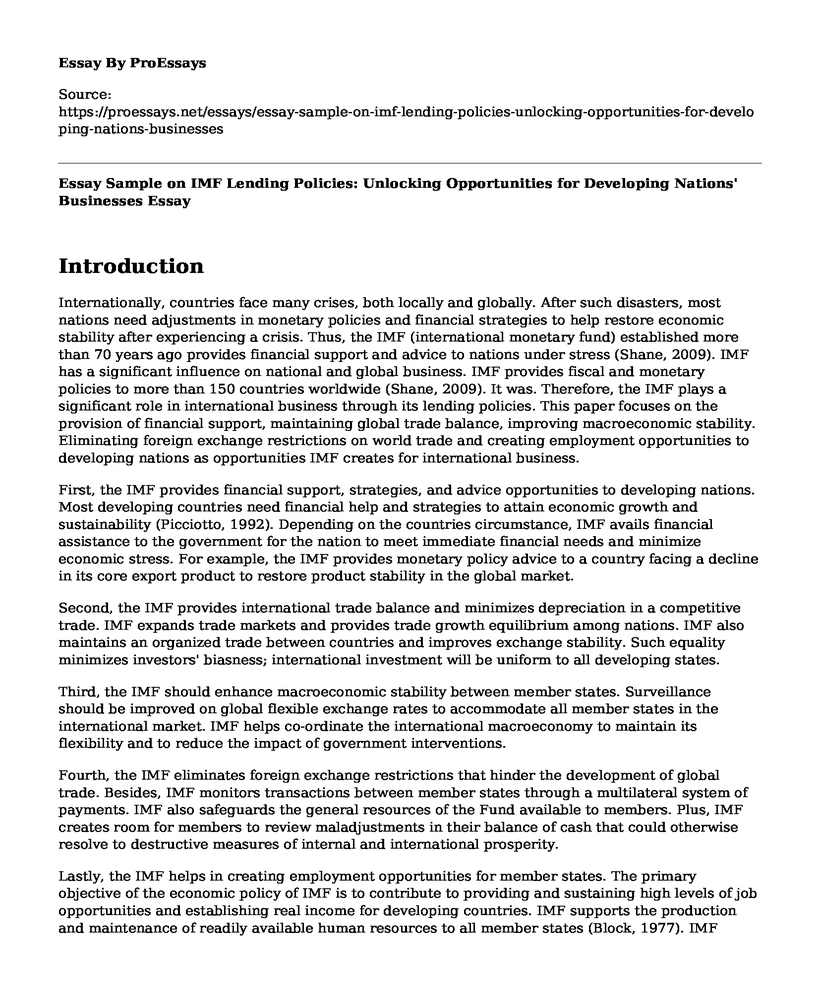Introduction
Internationally, countries face many crises, both locally and globally. After such disasters, most nations need adjustments in monetary policies and financial strategies to help restore economic stability after experiencing a crisis. Thus, the IMF (international monetary fund) established more than 70 years ago provides financial support and advice to nations under stress (Shane, 2009). IMF has a significant influence on national and global business. IMF provides fiscal and monetary policies to more than 150 countries worldwide (Shane, 2009). It was. Therefore, the IMF plays a significant role in international business through its lending policies. This paper focuses on the provision of financial support, maintaining global trade balance, improving macroeconomic stability. Eliminating foreign exchange restrictions on world trade and creating employment opportunities to developing nations as opportunities IMF creates for international business.
First, the IMF provides financial support, strategies, and advice opportunities to developing nations. Most developing countries need financial help and strategies to attain economic growth and sustainability (Picciotto, 1992). Depending on the countries circumstance, IMF avails financial assistance to the government for the nation to meet immediate financial needs and minimize economic stress. For example, the IMF provides monetary policy advice to a country facing a decline in its core export product to restore product stability in the global market.
Second, the IMF provides international trade balance and minimizes depreciation in a competitive trade. IMF expands trade markets and provides trade growth equilibrium among nations. IMF also maintains an organized trade between countries and improves exchange stability. Such equality minimizes investors' biasness; international investment will be uniform to all developing states.
Third, the IMF should enhance macroeconomic stability between member states. Surveillance should be improved on global flexible exchange rates to accommodate all member states in the international market. IMF helps co-ordinate the international macroeconomy to maintain its flexibility and to reduce the impact of government interventions.
Fourth, the IMF eliminates foreign exchange restrictions that hinder the development of global trade. Besides, IMF monitors transactions between member states through a multilateral system of payments. IMF also safeguards the general resources of the Fund available to members. Plus, IMF creates room for members to review maladjustments in their balance of cash that could otherwise resolve to destructive measures of internal and international prosperity.
Lastly, the IMF helps in creating employment opportunities for member states. The primary objective of the economic policy of IMF is to contribute to providing and sustaining high levels of job opportunities and establishing real income for developing countries. IMF supports the production and maintenance of readily available human resources to all member states (Block, 1977). IMF encourages regional negotiations that allow free and equal employment to member countries. Low-income countries benefit from IMFs investments on heath, thus improving social spending.
Conclusion
In conclusion, IMF lending policies create many opportunities for international business. IMFs provision of financial support, maintaining global trade balance, improving macroeconomic stability, eliminating foreign exchange restrictions on world trade, and creating employment opportunities to developing nations are some of the opportunities created by IMF. Thus, developing countries benefit more from IMF lending policies.
References
Block, F. L. (1977). The origins of international economic disorder: a study of United States international monetary policy from World War II to the present (No. 214). University of California Press.
Picciotto, S. (1992). International business taxation (p. 65). London: Weidenfeld & Nicolson. Retrieved from http://citeseerx.ist.psu.edu/viewdoc/download?doi=10.1.1.364.9035&rep=rep1&type=pdf
Shane, S. (2009). Why encouraging more people to become entrepreneurs is bad public policy. Small business economics, 33(2), 141-149. Retrieved from https://link.springer.com/article/10.1007/s11187-009-9215-5
Cite this page
Essay Sample on IMF Lending Policies: Unlocking Opportunities for Developing Nations' Businesses. (2023, May 22). Retrieved from https://proessays.net/essays/essay-sample-on-imf-lending-policies-unlocking-opportunities-for-developing-nations-businesses
If you are the original author of this essay and no longer wish to have it published on the ProEssays website, please click below to request its removal:
- Entrepreneurship Annotated Bibliographhy Paper Example
- Decision Making for an International Business Essay Example
- Essay Example on Cultivating an Ethical Organization: Benefits of Establishing a Code of Ethics
- Essay Sample on Venture Capital: Valuable Guidance, Expertise & Networking for Startups
- Examining BOH Tech Utilization in US Restaurants - Essay Sample
- Essay Example on Lead Batteries: A Business Idea to Reduce Global Warming
- Essay Example on Grow Business with GYB & DYB: Augmenting Business Sustainability







